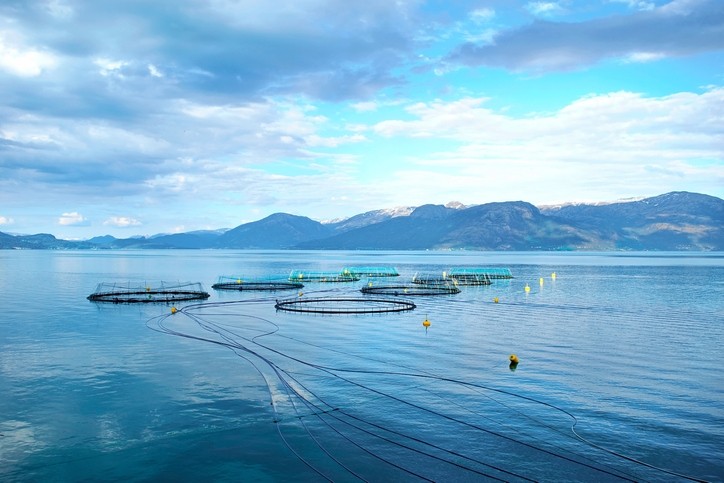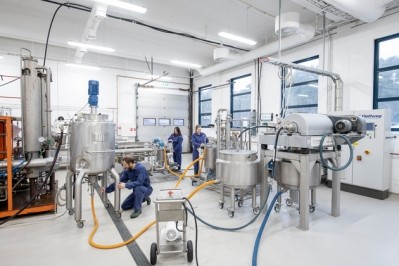Nofima led alliance aims to accelerate the development of sustainable salmon feed ingredients

The project is set to last four years. The idea is the ingredients have strong circular economy and carbon footprint credentials.
With a €1.3m budget, the initiative is primarily funded by the Research Council of Norway and as well as Nofima, comprises another research organization, SINTEF Ocean, along with companies: InnovaFeed, Corbion Algae Ingredients, Cargill, and French retailer, Auchan.
The project will study two alternative feed ingredients – an insect-based feed from InnovaFeed and an algae-based omega-3 product from Corbion.
Compatibility of ingredients with dietary requirements of salmon
The evidence-based study will test the levels that are required to optimize physical and nutritional needs of salmon, discover the practical and functional properties of both alternatives, as well as demonstrate the environmental and societal aspects of the suggested innovations.
SINTEF Ocean will be conducting a life cycle analysis of the resulting feed.
“By joining forces, we are accelerating the innovation in the sector to find new solutions to increase the flexibility in the choice of sustainable raw materials for future fish feed,” said Katerina Kousoulaki, project leader and senior scientist at Nofima.
The project was formed as a response to the critical need to accelerate the global momentum around sourcing, scaling and developing sustainable, alternative solutions for aquaculture and to address changing consumer behavior.
The UN FAO predicts the world will reach 9 billion people by 2050 and with its +5% year-over-year production growth, aquaculture is expected to play a critical role in assuring global food security. To meet this need, the FAO urges the industry to catalyze change, calling on it to produce more nutritious food using less resources, emitting lower carbon dioxide emissions and protecting biodiversity and the resilience of ecosystems.
The partners say the project addresses this industry demand by working to provide by 2025 an integrated solution to salmon farmers that balances the raw materials in the feed basket and provides greater flexibility from the use of finite marine resources and land-demanding resources.
Kousoulaki told FeedNavigator the Millennial Salmon project will comprise technical, biological, environmental and economic studies.
Technical studies will be conducted in the newly inaugurated Aquafeed Technology Center (ATC) at Nofima's site in Bergen, and will be led by senior researcher, Dr Tor Andreas Samuelsen, with the involvement of the industrial partners: Corbion, Innovafeed and Cargill, she explained.
Preliminary salmon feeding trials will evaluate microalgae or insect meal at different inclusion levels and in different rearing conditions. Trials will be conducted in land-based tanks at Nofima’s research station at Sunndalsøra in Norway as well as in sea cages at GIFAS, a Norwegian research organization. The scientists leading this work are Nofima researchers: Dr André Bogevik and prof Bente Ruyter.
A final health, welfare and performance documentation study will be carried out at GIFAS and will be conducted using a commercial-like diet as a control. That study will be led by Kousoulaki.
Auchan, she said, will conduct consumer studies in France to map consumer preferences and demands and see how those match up with the overall concept of the project - the development of ingredients with robust circular economy and carbon footprint credentials.
Innovation center
The ATC was set up by Nofima in collaboration with the University of Bergen and NORCE. It consists of four departments:
- Bioprocessing – fermentation and cultivation of algae
- Downstream processing – processing and recipes for ingredients
- Extrusion and feed technology
- Analytical methods and documentation of ingredients and end products
Earlier this month, the Norwegian minister for fisheries and seafood, Odd Emil Ingebrigtsen, officiated at the opening of the ATC.
“This world-class center is the result of targeted investment over many years. It will be made accessible to researchers from all countries. Open research forms its foundation. Access to this type of state-of-the-art research infrastructure also makes Norwegian research communities attractive partners for leading international research communities,” Ingebrigtsen said in his opening speech.
In terms of novel sustainable fish feed raw materials, there are many being explored, with new feed inputs originating from krill, bacteria, mesopelagic species, tunicates, microalgae, kelp species, grasshoppers and black soldier fly (BSF) larvae coming to the fore.
However, Mari Moren, research director, Nofima, stressed: “It is not as simple as just removing soy and then adding a new raw material. Firstly, research must be conducted on the suitability of raw materials [for use in] feed pellets because feed production is rather complex. We have to start in the right place. Sustainable raw materials must first be processed in the correct manner before they can be used in salmon feed.”
















